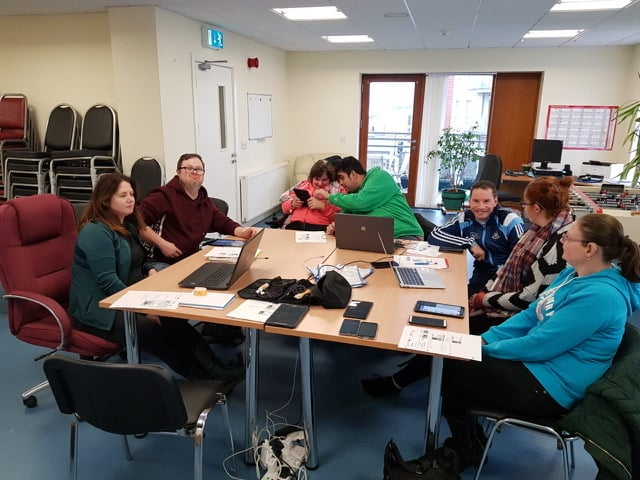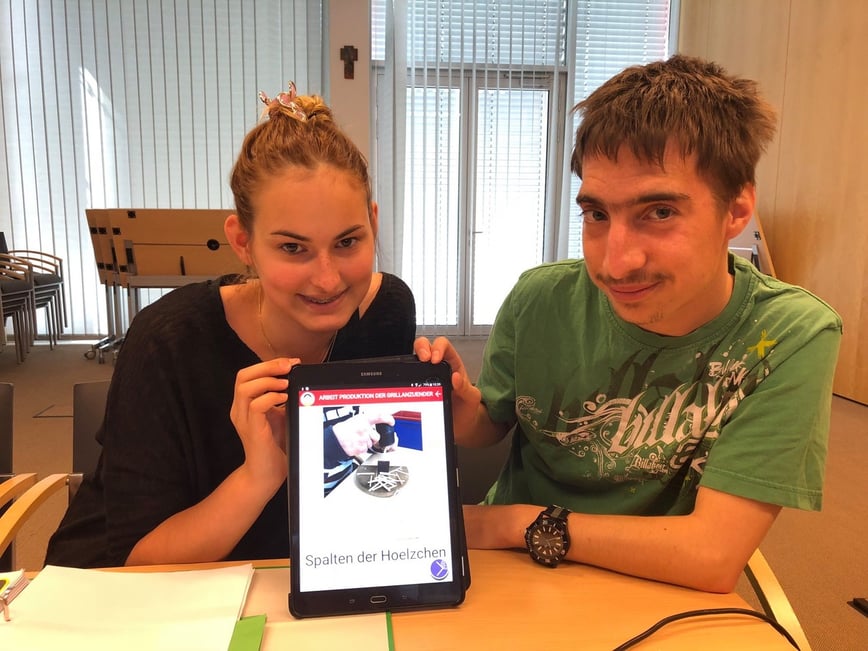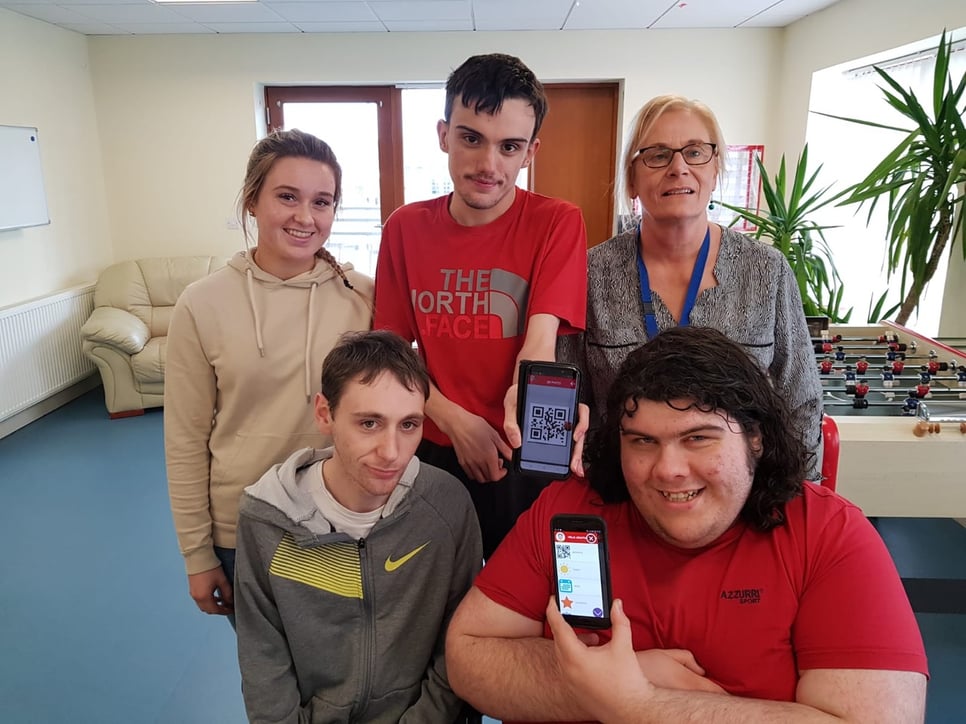Empowered by Erasmus+: Living through Lockdown via European Collaboration
For our latest blog, Anne Molloy, Inclusion and Diversity Advisor with Léargas, spoke with Sarah Boland. Sarah is Assistive Technology Facilitator at Saint John of God Community Services, which provides mental health and intellectual disability support services in Ireland. Through her work with SJOG, Sarah has been involved in several Adult Education Erasmus+ Strategic Partnerships which focused on digital skills and accessibility. Here we examine the impact these Erasmus+ projects had on beneficiaries following the enforcement of COVID-19 restrictions.
"If we hadn’t been involved in the European projects, we wouldn’t have that digital infrastructure and learning in place, so wouldn’t have been able to connect online," Sarah says, setting the scene for what could have been an exceptionally difficult time for those who avail of SJOG services.
When the emergence of COVID-19 brought life as we knew it to a near standstill, Sarah quickly realised just how effective previous projects had been for participants. Ultimately, their participation allowed them to navigate a world that went almost entirely digital in what felt like the blink of an eye. "If we hadn’t been involved in the European projects, we wouldn’t have that digital infrastructure."
"If we hadn’t been involved in the European projects, we wouldn’t have that digital infrastructure."
But was it really as simple as that? Did engagement at a European level really ensure an easier experience during the height of global restrictions? Well, it certainly seems that way!
"When COVID happened, not only did the men and women have the skills from the Erasmus+ projects, they had the confidence to join our online engagement programme through Zoom. They were able to just get on with it. They have developed diverse new competencies and some of the participants now lead many of the sessions. They’re absolutely excelling on it," Sarah tells us.
But how did it all start? Who identified the key priorities? And what type of projects did the collaborating partners embark upon? Let's take a look at St John of God's experience of Erasmus+, consider the goals and reflect on the impact!
Strategic Partnerships and Specific Priorities
Through engagement with Erasmus+, SJOG in Ireland has successfully collaborated with numerous other countries across Europe, including Austria, Spain, Portugal, Greece, France, Germany, Poland and Cyprus!
Indeed, meeting Erasmus+ partners in Rome helped kickstart discussion around inclusion, with Sarah explaining: "We looked at how we could embrace our vision of inclusion. While we have similar values, each country is coming from different approaches and structures. There are a lot of learning opportunities in working together."
"For example, in Ireland, our target group are involved in the community, engaging in Adult Education, having jobs and taking public transport," she continued. "If we switch over to our partner in Germany they have a huge campus. It’s state of the art, but very different. They have housing and workshops on campus, they live in a village so have different experiences." "There are a lot of learning opportunities in working together."
"There are a lot of learning opportunities in working together."
However, despite structures varying from country to country, key priorities remain consistent across all SJOG services, and they centre on the empowerment of those who avail of the services, with specific focus on digital development.
"Our focus has been on digital skills and accessibility which are key for the men and women we work with," Sarah explains. "When they are out in the community and working, these skills are important. The Strategic Partnership projects meant we could develop tools and outputs with our European partners that were designed for our target group."
From Entelis+ to LETITBE
So, let's take a look at just some of the projects that gave rise to a sense of digital autonomy and allowed participants to safely navigate one of the most turbulent periods in recent history.
Entelis+, European Network for Technology Enhanced Learning in an Inclusive Society, ran between 2014 and 2016. The focus was on ensuring persons with disabilities were part of an "inclusive education system, have equal opportunities, contribute to society and have access to high-quality services enabling them to live independently."
LETITBE, Learning Through Innovative Technologies Boosting Equality, was an extension of another project, and had two main objectives. The first was to "enhance the social and professional inclusion of adult learners with disabilities through an increased use of digital technologies" while the second was to "make educational centres more inclusive, participatory and respectful of the rights of learners with disabilities."
Then there's Mefacilyta DeskTop! In collaboration with Spain, Germany, Poland, Portugal, Austria and France, SJOG in Ireland worked on a skill teaching app, which is an international version of an app originally developed by the Vodafone Foundation in Spain. It aims to "create step-by-step instructional activities to support the service users to do things independently and with more autonomy."
"We got to build individual supports for people – looking at what does the person wants to learn – what skills do they need – and then looking at how could multimedia (pictures, voice, video) help them to carry out that task," Sarah explains.
Indeed, Irish volunteers identified the skills they would like to develop and were then pivotal in creating step-by-step guides which allowed them to acquire those skills.
"In one project we were involved in we provided over 400 specific activities for individuals," Sarah recalls. "We started with really basic tasks like personal care and reminders. One of the big challenges for the people we support is scheduling – knowing what is happening on what day so that was all built into the app we developed. Now they and front line managers can see the benefits of digital skills."
Projecting Positivity Through Partnership
Not only did the learning from the digital projects serve participants immeasurably, the human connection did much to buoy all those involved. The partnerships established through Erasmus+ bore considerable fruit for St John of God Community Services, and the organisations they worked with. Indeed, during a time of considerable uncertainty and upheaval, the partners leaned on each other for practical and emotional support. Whether it was learning from partners' COVID protocols or absorbing partners' teaching methods, the peer-to-peer learning opportunities were priceless.
"When we realised that we couldn’t travel to meet our partners in Europe, we had to think about how can we move this online and keep the project going," Sarah says. "It was a great support to hear first-hand from our European partners, who were a few weeks ahead of us on the COVID curve how they were dealing with various issues. It was great to be able to share process and guidelines and support each other through this tough time."
"We had to think about how can we move this online and keep the project going."
Like many endeavours over the course of the last 12 months, those involved navigated a steep learning curve at times, but the rewards made the efforts worthwhile.
"Working with university partners meant we could see how they were engaging with online learning in that setting and it was really interesting to see what other support services were doing to keep people engaged and what new things we could try," Sarah said.
"Some worked well, some didn’t, but it was an absolute bonus to get ideas from our partners – all you could do is learn from them!"
For more information on Adult Education, please contact our Programmes Support and Development Team.
Images courtesy of Sarah Boland.
